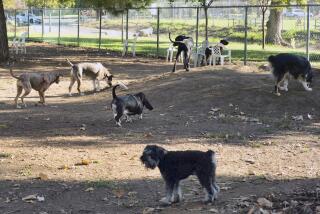It Doesn’t Make Any Sense to Be Using Human Shampoo for the Hair of the Dog
- Share via
Q: Can I use people shampoo on my dog? I have been using Head and Shoulders on our poodle but have been told that it may not be good for her. What should I use?
Amy Stein, Anaheim
A: You should not be using human shampoo on dogs unless it has been recommended by your veterinarian. People and dogs have a different skin acidity (pH) and different levels of oils and hair types. You should use shampoos for dogs only. Ask your vet for the proper shampoo to use, especially if your dog has a skin disease.
Q: Several weeks ago, we picked out a young border collie-mix from a local animal shelter and brought her home after she had been given a rabies and distemper vaccination series at the shelter. She did very well for almost a week but then started to have coughing and gagging fits, as if there was something caught in her throat. She still eats well but is not as active as before.
We took her to our veterinarian, who said that she probably has “kennel cough.” He put her on some antibiotics, and she seems to be getting better, although she still coughs once in a while.
Is there any possibility that she might have something else, since she had been given vaccinations at the shelter? Should we have her examined again in case she has pneumonia? We are happy with our veterinarian but want to make sure that she is all right.
RJM, Costa Mesa
A: It is not uncommon for dogs that are kept in close quarters such as a shelter or kennel to develop several forms of coughing that are often improperly called “kennel cough.” What generally occurs is an infection of the upper airway system, which includes the trachea or windpipe and the larger airways of the lungs, called bronchi. These areas become inflamed and produce lots of mucus, which causes the gagging and deep hoarse cough. This is very similar to bronchitis in people.
There are vaccinations available for the most common forms of tracheobronchitis. One is a vaccine against the canine adenovirus, which develops flu-like signs in dogs. There is a bacterial organism called Bordetella bronchiseptica, which is a primary cause of upper respiratory diseases and can be vaccinated against. Unfortunately, there may be other agents that can cause signs of tracheobronchitis for which we have no vaccination.
All of these infections are treated in a supportive manner with the use of antibiotics and cough-suppressant medications. Vaccinations do provide a good measure of protection if given before exposure and may reduce the severity of signs if given while the disease is incubating. Your dog may have been exposed before its vaccines. Since your dog seems to be getting better on treatment, I would recommend another examination by your veterinarian just to make sure all is doing well. Your dog may also need a second or booster vaccination to help provide adequate protection. In many cases the disease is self-limiting, but in some cases it becomes chronic and requires long-term therapy.
Got a question about your pet? Write to: Dr. Glenn Ericson, Ask the Vet, Orange County Life, The Times, 1375 Sunflower Ave., Costa Mesa, Calif. 92626.
More to Read
Sign up for Essential California
The most important California stories and recommendations in your inbox every morning.
You may occasionally receive promotional content from the Los Angeles Times.













